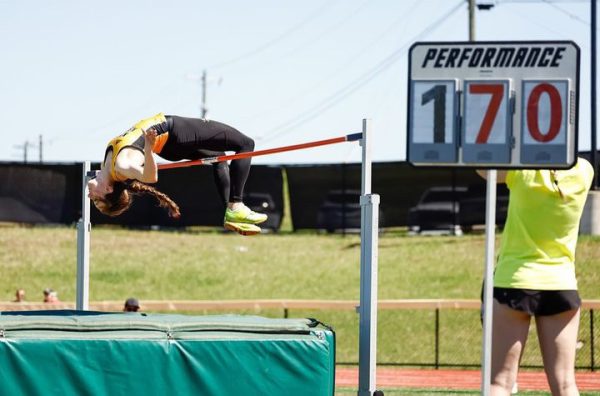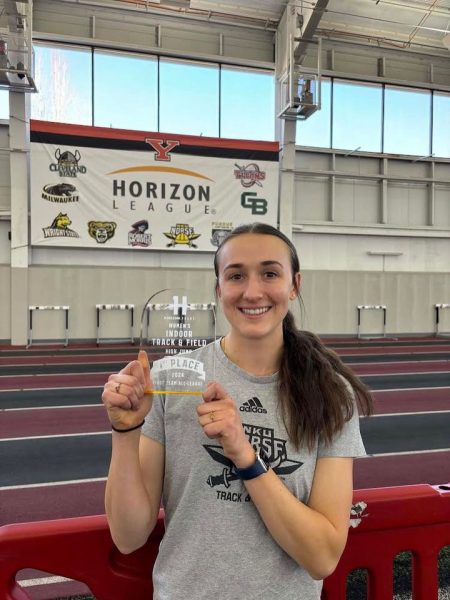There is a certain stigma that has been seen around student-athletes for a while, in which they are held to a standard of being the most put-together students, having serious attitudes and being almost “perfect” when it comes to being a good role model. They are expected to be grateful for the opportunity they have, almost to the point of being indebted to the school and expected to do whatever they are asked without a single complaint. Dr. Randall Cutler, NKU’s psychologist, talked about the mindset other students have about student-athletes and their expectations.
“There’s a stereotype, you’re supposed to be tough. You’re supposed to be able to handle adversity. Why do you have problems? You’re the star athlete,” said Dr. Cutler.
When Meredith Goff, NKU track sprinter, was asked about what in her sport creates such a mental struggle, she talked about the continuity of it.
“Track is a year-round sport for me and the lack of a break can lead to burnout. Plus there is always the added stress of school on top of track,” said Goff. “Sometimes it’s exhausting and it’s hard to have energy for anything other than school and track.”
These long seasons of always competing can compromise a student-athletes mental health and build up to a point where the sport isn’t as fun as it could be. Goff was starting to notice that there was a feeling she could not shake.
“I started feeling pretty helpless after a while, and that is not a feeling I like to have. In the past, I’ve always thought I could just handle it myself and that would be that,” said Goff“But it was getting to the point where I was not able to help myself, and I was creating a toxic cycle. I reached out to my mom and she helped me find resources where I could find someone to be a third party to me and my mind. It helped a lot.”

Goff had to find a way to revitalize her perspective on not only her sport, but her general day to day feelings. Therapy was going to be that form of revitalization that would once again help her discover her own stride.
“I did two therapy sessions and while it wasn’t like a magic solution, it did help me gain some insight into my mentality and mindset. It gave me some ideas to use to improve my outlook and appreciate the fun rather than the expectations and pressure. Whether it be a designated mental health resource or just the people in general, I feel like I’ve been able to get everything I need at NKU to help me,” said Goff. “Compared to a year ago, I’m in a much better place mentally because I was provided with the right resources and help.” she said.
Goff has since hit the track and gotten back into her lane to her race towards success.
When talking to Dr. Cutler about what struggles he sees student-athletes most often have when they start sessions with him, he said “the biggest overlying struggles was the self-imposed expectations about performance,”
“It’s like a job. A lot of them are coming in feeling overwhelmed and having a hard time juggling it all,” said Cutler “They’ve been highly successful for most of their life and then they get to this level where everybody is a star, and a lot of them are struggling with the expectations of being successful.”
Highly achieved NKU track athlete, Julia Pohl talked very openly about her mental health struggles during her last offseason. Pohl had been a very accomplished track star at George Rogers Clark High School, winning two gold medals for long jump, a solo gold medal in both high and triple jump and a gold in the 400m. The success continued at NKU, as she broke records at the indoor conference competition, which continued to set the bar higher for herself.

“Those expectations, they’re in the back of your head. ’You have to do this again.’ It was just so hard keeping those expectations,” said Pohl. “I’ll do whatever it takes to do this again, PR again. I’d be constantly thinking about track and field and hitting my PR. I was scared I wasn’t going to do well.”
The sport was no longer as fun as it once was with all the stress of performing to the best of her abilities as she had been able to do in high school. Pohl needed to find a way to relax her mind and put herself in a spot where she could enjoy the progress she made in the sport without pulling herself down for every slight mistake she made.
Talking to teammates and laughing with them on the bus and not taking everything so serious was a huge key that Pohl stated it helped her get through her mental health struggles.
However, that was not the only strategy that Pohl said helped her through her struggles. Not listening to serious music was just as important and aided her in her strive back to the peak of her mentality.
“I just remember listening to stuff that was just so serious or angry like a lot of rap or intense songs to get focused or game ready, but it just added a degree of almost anger or fear or bad moods instead of confidence,” Pohl said.
What was the genre that she switched to? 2010’s pop.
“I think that’s why a more upbeat and just enjoy the present moment sort of music helped me more as well.” said Pohl.
A quick breakdown of her new playlist goes like this:
- Out of My League- Fitz and The Tantrums
- Electric Love- BORNS
- Tongue Tied-GROUPLOVE
- We Are Young- fun.
She made sure to emphasize that “Tongue Tied” and the band “Fun.” were some of her favorite’s on her new pump-up playlist.

While Pohl may not have used the resources at NKU, she found herself able to empower herself with her own strategies and found herself able to make the game she had loved fun again. Her success has continued to build and as a result she recently broke her own record and the school record for NKU women’s outdoor high jump with a 1.73 meter leap at the school’s first home meet.
Dr. Cutler mentioned that often the athletes need the push to get them to seek out resources, whether that be from family, coaches, or even athletic trainers at times. NKU women’s basketball coach, Jeff Hans, said that is one way coaches can help their players in a major way.
“Be aware of what they’re going through,” Hans said.
Hans said that doing this is one of the many responsibilities of a coach, so they can know when to encourage players to seek out their resources when struggling. Hans said it is imperative to point them in the right direction for help and to “know them, not only as an athlete, but as a young person.”
Part of knowing them is knowing what is draining, and identifying the signs of an athlete who is struggling. Hans felt the most draining aspect his players have to deal with is time management and pressure.
He said so many people are vying for their attention so it’s hard for them to focus on one thing and that often puts the athlete in a position where they aren’t prioritizing themself.
Hans mentioned that any coach should be looking for signs their player is struggling, such as them not acting the same in practice or around their teammates. He said it is important for coaches to let their players know that they are a safe space to reach out to when they are in need.
Hans credited this ability to be hyper-aware of mental health to the changing landscape of mental health recently. He admits that in the past “you just kept pushing players” whenever it seemed like they were struggling. He added that when he was an NKU assistant coach from 2008-2011 that [mental health] resources weren’t as enriched as they are now, saying that it wasn’t talked about then.

Coach Hans said that has all changed and “we are very aware now”. He said a big change has been seen over the last 5-10 years with a big shift happening during COVID-19 when mental health problems were at an all-time high.
There are still many student-athletes who struggle with their mental health, but there are resources available to them such as trusted counselors here at NKU that are more than willing to help.
“I feel like a lot of people say more of a general ‘Oh you’re not alone,’ but I would say you don’t have to do it on your own,” Pohl said when asked what advice she would have for student-athletes who are hesitant to reach out to the counseling resources. “You don’t have to put it all on your own shoulders. You don’t have to endure this all yourself. It’s okay to let someone else help you out.” said Pohl.
Meredith Goff shared the sentiment, as she said, “Don’t be afraid to ask for help if you need it. I was so scared people wouldn’t take me seriously or would blow it off. But I was wrong; the people who really cared about me took me seriously and helped me when I needed it. And if they don’t listen and don’t want to help you, there are plenty of people who will!”
If you’re a student-athlete and you’re interested in reaching out to the resources here at NKU, you can visit them in the University Center in room 440. If you’d prefer to schedule your first appointment online, you can call them at (859) 572-5650 or email them at hcsw@nku.edu. Dr. Cutler is one of the many tremendous faculty that are working to help you better yourself, and help you discover your value.
“Talking to someone can be really scary and really tough and that’s ok, it’s normal. Your struggles and challenges, we all have them, so let’s figure out what you wanna be and what you want your life to look like. You’re worth whatever it takes.” Dr. Cutler said.


